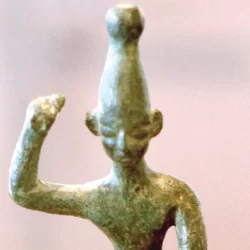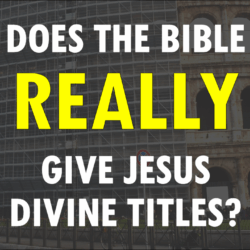The first verse of John’s Gospel reads: “In the beginning was the word, and the word was with God, and the word was God.” Typically, Christians understand the Word to refer to the Son and God to refer to the Father. However, as John Schoenheit explains, this reading owes more to later trinitarian theology than the native biblical context. Instead of assuming the Word just is the Son, Schoenheit carefully shows how God’s word is his plan for salvation. In fact this is what became incarnate in Jesus in verse 14.
Here’s a link to John Schoenheit’s slideshow
Links:
- Listen to my interview with Schoenheit, called Word of Faith vs. Trusting God
- More on John 1.1 from a biblical unitarian perspective available at ChristianMonotheism.com
- Check out videos of the other presentations from KingdomFest 2017
- Intro music: “District Four” by Kevin MacLeod. Licensed under Creative Commons: By Attribution 3.0 License.







Why do believe in Monotheism compared to Trinitarianism today? Trinitarianism is not even a word!! I believe in one God but I am always corrected that God is 3. I don’t think we can truly explain trinitarianism as God being 3. I am always refuted for it. I know you guys come from Presbyterian, Methodist, Church of Christ, and so forth, but what makes u different than the Pentecostal or Baptist who absolutely believe in the trinity..
Hello David,
We do not believe the various Trinity theories best explain the scriptures. Instead, we agree with Jesus that the Father is the only true God (John 17.3) and that Jesus is the Messiah, God’s son. For more on this, see these posts
Hello Restitutio people,I loved reading through the slide show containing all of the references from reputable and respected scholars which, present objective arguments clarifying the true meaning of John 1:1. Having Greek heritage, and being able to read and write in modern Greek, it was easy to identify with slide 4 regarding the two basic meanings of the word logos, as used in the scriptures. Even though the christian scriptures were written in common Greek, (Greek that was common 2000 years ago). The word logos as used today is basically the same, and can carry with it, depending on the context similar meanings, as mentioned in slide 4. Although personally not being a Trinitarian, but having been in a religion that taught that the Christ had a pre-human existence, I always considered John 1:1 as referring to God and the Christ. I realize now that I had come to conclusions from reading this scripture, and others, with pre- conceived ideas rather than with the full knowledge of all of the linguistic factors at play, such as the idioms of the language of the time. Putting aside theological pre-conceived ideas of a Tri-une God or a pre-existing Christ and using just basic knowledge of modern Greek, John Schoenheit’s slideshow makes very good sense today as it would I imagine 2000 years ago. Just ask anyone on the street with basic knowledge of today’s Greek language who would put aside any religious bias and they would most certainly agree with the presentation. Keep up the good work Sean, and thanks for the time to bring together well researched and compelling information that brings out the truth.
Shalom, I have really learned a lot of great stuff from you, and Anothony buzzard in regards to greek reading of texts, and I want to thank you a lot.